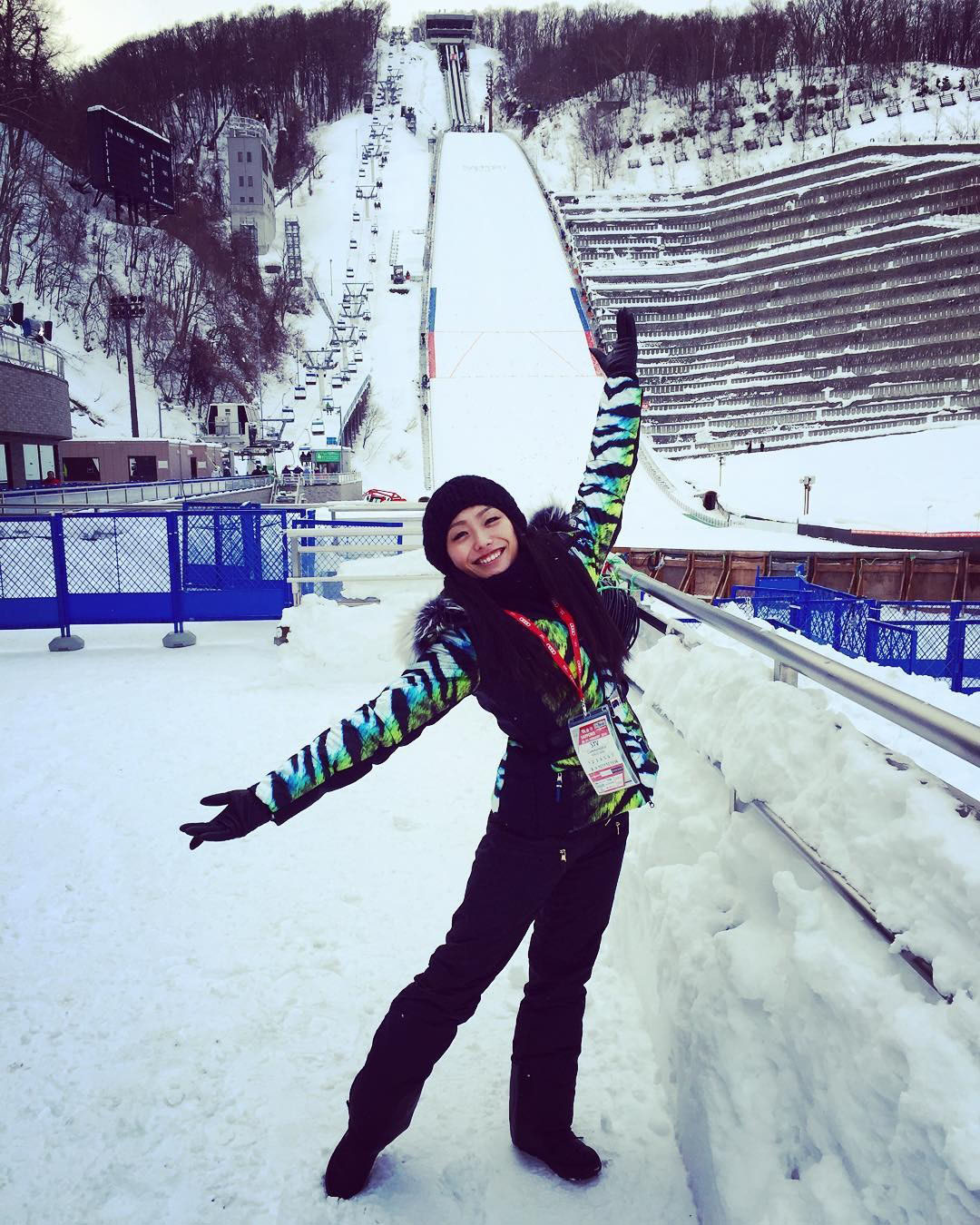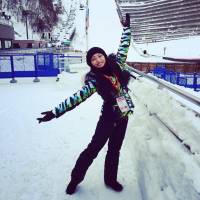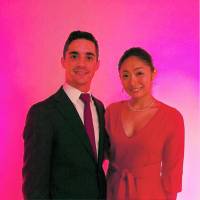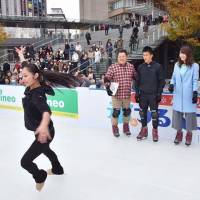Freed from the constraints of competition, retired athletes often change directions. Some go into business, a few into TV, others into coaching or various endeavors.
For two-time world champion Miki Ando, it is all of the above.
The former skating star looks to be more popular than ever now based on her busy schedule, which sees her traveling for work several days each month.
Ando, who turned 29 last month, can now be frequently found in various parts of the globe or Japan for skating or other jobs. Shows in Rome and Madrid, coaching camps in Spain and the Netherlands, appearances in Tokyo and Sapporo, it all makes for a new and very busy life for the Nagoya native.
The two-time Olympian retired after the 2013 Japan nationals, and despite being the mother of a young child, has undertaken a challenging calendar as she continues the transition from her skating days. Add into this her long distance relationship with two-time world champion Javier Fernandez of Spain, and Ando has a full plate on her hands.
I have always maintained a deep admiration for Ando, who in compliant Japan has done it her own way, refusing to be boxed in by the conservative culture and system of seniority.
In an exclusive interview with Ice Time, Ando discussed her work, her love, her true dream and her future.
Ando says her second career began without a great deal of planning. It just kind of evolved as a result of her name recognition and contacts.
"The TV people were interested in me because figure skating is so popular now and I'm a former skater," Ando noted. "They saw I had a different personality than when I was on the ice. I was thinking to keep myself busy and popular, because otherwise they are going to forget about me."
Ando says that though she is often on TV, she doesn't want to be constricted to just one field.
"I don't want to be only a TV talent," she commented. "I am a figure skater for life. All the time I am on some TV show is because of sports. I go to some event because of sports or figure skating."
Ando cited two seasons as when she is especially busy.
"I am busy in the spring and summer for the skating shows, so it is hard for me to have TV work," she said. "Shows and rehearsals in this city, then come back and a couple of days later in another city."
Ice Time had noticed how Ando would appear in various places both domestic and international via social media and asked her how these opportunities came about.
"People contact me in many ways for work," she stated. "I have an official Facebook page, so they message me because they have no idea how to contact me. The TV people know each other so they know how to get in touch. For skating events, because I have so many friends in Japan and other countries, they will contact me through Instagram or a direct message on Twitter."
Ando's daughter Himawari (meaning "sunflower" in Japanese) was born in April 2013, after she had announced her intention to compete for a spot on Japan's team for the Sochi Olympics. The news took many by surprise and created quite a stir in the media.
"Honestly, 98 percent of the people said it was so bad," Ando recalled. "It was on the TV news. Me giving birth as an athlete and it was an Olympic year. Also, from normal people, they thought I had no respect as an athlete.
"Because I had already announced I was going to come back," she said. "But so many sports commentators said it would not be possible."
Ice Time then questioned Ando on what she thought the true reasons were for the negative reaction by so many.
"What I saw was that it was because I was an athlete and (gave birth) without getting married," she said.
Ando herself was surprised when she found out she was expecting.
"I didn't know I was pregnant until I was five months along," she stated. "I did not have any sickness and I felt fine. We did a blood test. I was surprised, because I was skating and performing. But it was a happy thing."
Ando then talked about the difficulty that some female athletes have in maintaining a normal cycle.
"Sometimes it is hard for athletes to get pregnant," she said. "We are training so hard. Sometimes we could not have a baby. Skating is really important for me, but I started thinking that after I stop skating it will be a longer life.
"It was most important for me to have a normal life for the future. I think it was destiny to have a baby and I was ready."
Ice Time queried Ando about her daughter's name and how it was chosen.
"A sunflower follows the sun all the time," Ando commented. "My image of flowers is a rose is gorgeous and strong and so nice. A sakura is pretty and cute. But I feel like when I see a sunflower I get good energy and I feel strong and so positive.
"If my baby were to be a sunflower, I wanted her to follow a lot of love like a sunflower," Ando said. "I was hoping people that met her, like my fans, my family, everybody, got good energy from my daughter."
Ando, who lives in Yokohama, tries to include Himawari in her life as much as she can with her congested calendar.
"When I have work my Mom takes care of my daughter," Ando said. "But for skating shows I take her with me. For TV work or some event I ask my Mom. My daughter understands it's my job."
Ando's illustrious career has included many notable accomplishments. She was the 2004 world junior champion, a three-time Japan junior gold medalist and a three-time Japan senior winner. But for all of the glory, Ando is most remembered by many for a singular achievement that still stands alone in skating history.
At the 2002 Junior Grand Prix Final in The Hague, Netherlands, Ando became the first woman in history to cleanly land a quadruple salchow. To illustrate the true greatness of the feat, consider that more than 14 years later no woman has landed another quad in competition.
Ando believes it was at this point that interest in her began building.
"People started talking about me for the first time after I did it (the quad salchow) in competition," she said, looking back. "I didn't know much about figure skating at that time. I liked it. I loved it, to be skating on the ice with my coach and that was it.
"For me the quad was normal," Ando added. "You learn a single, then a double, then a triple. The next step was a quad."
Ice Time asked Ando if she wondered why nobody has been able to replicate her history-making jump in the many years that have gone by since.
"I never thought about the others skaters doing it since," she said. "Everything is possible. The judging system, they are changing it all the time, so it's really hard to try something new."
Ando accurately cited the fact that skating in Japan has undergone a monumental change in popularity in the past decade and a half.
"When I did the quad salchow, figure skating was not a big sport in Japan," Ando noted. "That's probably also why it doesn't feel so special to me. I was 14 and I had no idea what was going on. I remember they made some announcement (at the rink) in English and I heard my name, but I could not understand English at that time, so I didn't think much of it.
"Then the next day the Japanese wire service reporter came to me and said, 'Are you Miki Ando?'
"I said, 'Yes' and then he asked me about the quad and told me I was the first woman in the world to do it. But I felt like I was just practicing for myself to grow up more."
One of the most interesting revelations of my talk with Ando was her level of interest in teaching others to skate.
"To be a coach was my biggest dream as a figure skater since when I was nine and began skating," she stated. "Actually I was competing as a top skater because I wanted to be a coach."
Ando believed as a youngster that her ticket to being a coach in the future lay in excelling as a competitor.
"Because if I can be a good skater I can learn more and see outside countries," she said. "I went to America. I had a Russian coach, I had an American coach. Now I work with David Wilson a lot, who is Canadian.
"I learned so many things, which is good for me for the future, for my dream. For now I don't want to say I'm coaching. I go to so many places to help. I think if I say, 'I'm coaching,' it means I quit pro skating also just to be a coach.
"But now I'm busy myself, so I can't be there all the time, so that means I'm not coaching, just helping. Like an adviser."
Ando recalled that her venture into working with young skaters began by happenstance.
"It started with an appearance in Iwate Prefecture," she said. "I did a charity show and exhibition there and then the coaches asked me if I would take a look at some of their skaters, so I said, 'Sure. If I have time I would love to do that.' That is how I got into teaching."
Ando's journey into instructing youngsters has brought her into contact with one of her former mentors.
"Yuko Monna, my former main coach, I help her and teach kids skating (in Nagoya)," Ando stated. "This year I also started choreographing for some skaters. It was also a good experience last summer for me to take three skaters from Nagoya to Javi's summer camp in Andorra.
"It was a good experience for them and me," Ando added. "They had never been outside of Japan. They are really talented. But what I saw was that they had good jump technique, but no skating skills or emotion. So if they go outside Japan they can see more emotion. International kids have more emotion than Japanese kids."
Ando, who won her first senior world title in 2007 in Tokyo, believes that her work with young skaters has also helped her on a path of self-discovery.
"I became a world champion, but now I have another life," she commented. "I'm still learning about myself as a coach, as a skater, as a professional skater, as a person."
Ando tries to draw the youngsters out while not intimidating them.
"Especially the Japanese kids are really shy and quiet," she noted. "I try to see their personality first, then I don't want them to feel that I am a world champion, just one of the coaches who come for one week to teach them something new and fun."
Ando then got sentimental remembering how she was infused with hope after losing her father in a traffic accident shortly after she began skating.
"My first coach was my inspiration to be a coach," Ando said. "Rina Horie was the one who first helped me at the rink. She was the teacher and she asked me if I was interested in learning to be a figure skater, so I said, 'Why not?,' because I liked skating already.
"She was so nice and sweet," Ando stated. "Especially after I lost my father, her smile it was shining all the time. I wanted to see her smile every day. I talked to her and I learned. I wanted to be like her. Smiling all the time and feeling something good together."
Ando remembered her precise feelings at that time long ago.
"If I'm going to be a figure skater, I want to be a coach like her," Ando commented. "She actually gave me the dream. I never had the dream to be a champion. I wanted to be a coach."
Though Ando had many highs and lows during her long skating career, the incredible season she had in 2010-11 remains one of the most impressive in Ice Time's memory.
Coming off the Vancouver Olympics, where she finished fifth, Ando was contemplating taking the season off to recharge her batteries.
"I didn't want to compete that season at all," Ando stated. "After the Olympics, my coach Nikolai Morozov told me maybe we can have one year off to be fresh. But then he realized that the worlds were going to be in Tokyo again, and he said, 'You're not going to have one year off. It's your country, so you should skate for it.'
"My mentality and my feeling were already off," Ando said. "I fought with him so much. I couldn't think about competing. I made three show numbers. I didn't make any competition numbers until I felt like I was ready to compete."
Ando says matters changed when she came home and saw her fellow skaters ramping up for the coming campaign.
"After doing a show in Japan I saw so many skaters preparing and I decided to try something new, which nobody else had done," she stated. "So I put five jumps in the second half (of the free skate) which is a bonus, because I knew that my skating skill was not as high as Yuna (Kim) or the other skaters.
"I wanted to do something different than them — become a strong jumper. I made a goal to fight for myself," she said. "Then the results just came — first, first, first."
Ando proceeded to win every non-exhibition event she entered that season, with the exception of the Grand Prix Final (where she came in fifth after changing one of her programs). Her skating was absolutely sublime and culminated with a victory over Kim at the worlds, after they were relocated to Moscow following the Tohoku disaster.
One of the enduring images of that season was seeing Ando on the top of the podium at the worlds with her gold medal, while Kim, who came in second, was overcome with emotion and wept. Ando had beaten the iconic Olympic champion.
Ice Time wanted to know what Ando recalled of that moment.
"I don't know how she felt," Ando commented. "She didn't do the Grand Prix (that season). She just came back for the worlds. I'm sure that it was really hard for her to be a top skater all the time and after the Olympics.
"She was free from the pressure," Ando said. "I would love to talk to her sometime, someday, but she never really talked as a person."
Of the many developments in Ando's life in recent years, she feels none has had a greater impact than her relationship with the 25-year-old Fernandez. She says the Spaniard has helped bring her out of a shell she had been in for a long time.
"We have been together for two years now," Ando stated. "He is a really positive person and a real sweetheart. He also knows how my life is in Japan. I always wore a mask or glasses because of paparazzi.
"I met him in 2008 when he was also with Morozov," she commented. "I already knew his personality. He's so fun and so kind. He changed my life. He told me, 'Why do you have to hide? Why do you have to have a secret?' "
The demands of being a celebrity in Japan for so many years had taken a toll on the sensitive Ando.
"For a long time I felt like I had no life," she said. "Why did I have to hide? Why did I have to have a secret?"
Ando admitted that Fernandez's commitment to her likely did not come easily.
"For him to be with me was probably a hard decision for him, because I have a baby and we are far away," she commented. "I quit skating and he is still going on for the Olympics. It was probably a very hard decision for him."
Ice Time asked how the relationship materialized.
"He came to me and asked me if we could try to work it out to be together, and I was so happy because I already had feelings for him," Ando recalled. "We announced that we were together when we were in Toronto and nobody knew about it beforehand."
Ando feels that Fernandez's outlook on life helped her to relax.
"I told him about Japanese culture, but he said to me, 'You have to change yourself, otherwise you have no life.' There is no joy to hide and have a secret. So I said, 'OK' because I trust him.
"Now it's more comfortable for me," she said. "I go out just as I am. It's less stress for me. He told me, 'People will think you are a more normal person.' "
The Madrid native then suggested that Ando be more open with Himawari, whose face she had not revealed in photos she released for public consumption.
"He asked me, 'Why don't you go out with your daughter?' I said I didn't want the paparazzi to get her picture and put her picture in the magazine or on social media."
Fernandez convinced Ando that she could simplify her life by letting her guard down.
"We posted a picture as a family," she stated. "After that, people came to know her face, and then it was nothing new for the paparazzi."
It was clear to Ice Time that Ando feels deep gratitude toward Fernandez for his advice.
"He really changed my life," she said. "Now in my position I have to support him as much as I can because I went through this situation. I was a world champion before he became one. Now he knows a lot, about how he has to work. I think I may have helped a bit with motivation last year. I just try to respect and support him."
Do the pair ever discuss technique or tactics?
"We don't talk about figure skating," Ando admitted. "I don't like to talk about figure skating during the day. Maybe just during the show or during practice.
"Javi is the same thing. He concentrates on the ice, but off the ice he doesn't want to talk about skating. He wants to talk about other things like vacation, or how we can have fun after the competition, or see something new."
Ando believes that Fernandez's record speaks for itself.
"I have nothing to tell him, because he is a wonderful skater," she added.
I asked Ando if she saw herself becoming a full-time coach in the future, traveling the Grand Prix circuit with young skaters.
"It depends on my relationship with Javi," she said. "I'm sure he will skate as a professional. I don't know about now, but before he was thinking he wanted to be a coach, too.
"If we are still together for the future, to have a good relationship, then we are going to decide where to go, where to teach, where to live," Ando commented. "But I can see at some point being a coach somewhere. I will have a base."




















With your current subscription plan you can comment on stories. However, before writing your first comment, please create a display name in the Profile section of your subscriber account page.